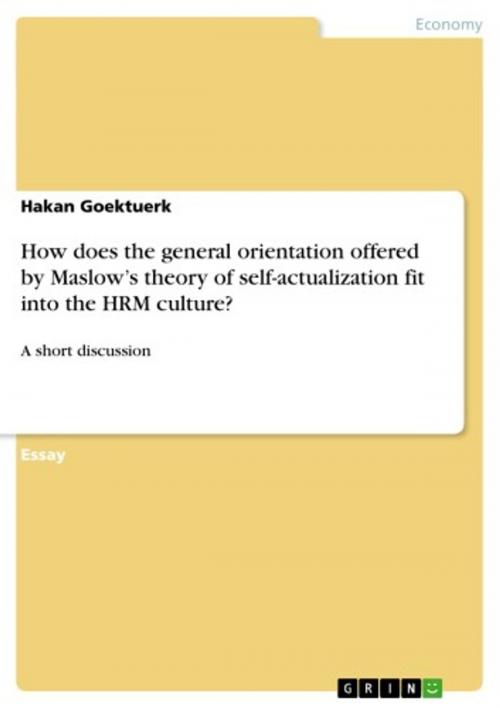How does the general orientation offered by Maslow's theory of self-actualization fit into the HRM culture?
A short discussion
Business & Finance, Management & Leadership, Management| Author: | Hakan Goektuerk | ISBN: | 9783638443098 |
| Publisher: | GRIN Publishing | Publication: | November 28, 2005 |
| Imprint: | GRIN Publishing | Language: | English |
| Author: | Hakan Goektuerk |
| ISBN: | 9783638443098 |
| Publisher: | GRIN Publishing |
| Publication: | November 28, 2005 |
| Imprint: | GRIN Publishing |
| Language: | English |
Essay from the year 2004 in the subject Business economics - Business Management, Corporate Governance, grade: 1,3, Lancaster University, 19 entries in the bibliography, language: English, abstract: This essay will concentrate on the phenomenon of Human Resource Management and how Maslow's theory of self-actualisation fits into its current form. The HRM's historical rise will be described in terms of 'soft-capitalism' as a solution to the 'problem of work'. Hence, the movement away from managing the objects of work to managing the subject of work, i.e. the worker, will be shown. Furthermore, I will highlight the processes of its emergence and its acceptability in a cultural framework, which will use Foucault's concept of 'discursive formations' and his ideas of 'power/knowledge' as well as 'governmentality'. Maslow's concept of self-actualisation and hierarchy of needs will be unpacked in term of his original work and the ideas that he has pushed into the HRM discourse. A critical assessment will be made by throwing some light on the ambivalence that lies between hypothetical assumptions and the scientific evidence, before its contemporary viewpoint will be reset in terms of HRM culture. In terms of this essay, its function as a technique of inscribing reality and thus acting upon it will be highlighted rather than elaborating on its implications for the motivation discourse (even though these aspects are interrelated). It will be argued that the subject-focused version of Maslow's work is merely another technique of rendering the subject manageable. The translation of the subjective into the 'objective' categories of the model will be provided by the normative structure which in turn will also be provided by the dogmatic structure of 'efficiency' and 'productivity'.
Essay from the year 2004 in the subject Business economics - Business Management, Corporate Governance, grade: 1,3, Lancaster University, 19 entries in the bibliography, language: English, abstract: This essay will concentrate on the phenomenon of Human Resource Management and how Maslow's theory of self-actualisation fits into its current form. The HRM's historical rise will be described in terms of 'soft-capitalism' as a solution to the 'problem of work'. Hence, the movement away from managing the objects of work to managing the subject of work, i.e. the worker, will be shown. Furthermore, I will highlight the processes of its emergence and its acceptability in a cultural framework, which will use Foucault's concept of 'discursive formations' and his ideas of 'power/knowledge' as well as 'governmentality'. Maslow's concept of self-actualisation and hierarchy of needs will be unpacked in term of his original work and the ideas that he has pushed into the HRM discourse. A critical assessment will be made by throwing some light on the ambivalence that lies between hypothetical assumptions and the scientific evidence, before its contemporary viewpoint will be reset in terms of HRM culture. In terms of this essay, its function as a technique of inscribing reality and thus acting upon it will be highlighted rather than elaborating on its implications for the motivation discourse (even though these aspects are interrelated). It will be argued that the subject-focused version of Maslow's work is merely another technique of rendering the subject manageable. The translation of the subjective into the 'objective' categories of the model will be provided by the normative structure which in turn will also be provided by the dogmatic structure of 'efficiency' and 'productivity'.















